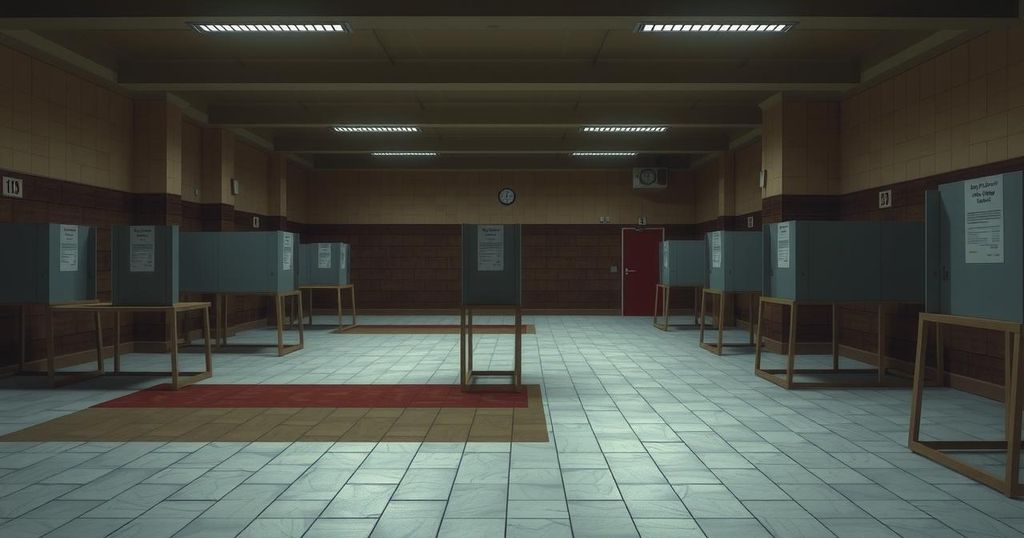Venezuelan Opposition Leader Promises ‘Empty’ Polling Stations for Upcoming Elections
Maria Corina Machado, Venezuelan opposition leader, advocates for a boycott of the May 25 elections, predicting empty polling stations. The opposition is divided, with factions split on whether to participate. Machado criticizes Maduro’s regime, asserting that engaging in the elections would legitimize a corrupt process. The political situation remains tenuous as divisions among opposition leaders complicate their stance against the government.
Maria Corina Machado, a prominent leader of the Venezuelan opposition, has publicly announced her intent to boycott the gubernatorial and legislative elections scheduled for May 25. In a recent Zoom interview with AFP, she asserted that polling stations would be “empty,” reflecting widespread discontent with President Nicolás Maduro. This announcement comes in the wake of what many, including Machado, describe as Maduro’s illegitimate reelection last July, which was largely dismissed by international observers and the opposition alike.
Machado characterized the upcoming regional vote as a “huge farce” designed to obscure the regime’s defeat in a previous election. The opposition leader, representing the movement against Maduro, expected that the regime would face significant backlash, stating that on May 25, it would find itself “absolutely alone” due to the anticipated mass boycott. While she leads a significant faction advocating for non-participation, the opposition remains divided over the election strategy, with some factions choosing to participate.
Under Maduro’s mandate, Venezuela has faced increasing turmoil. Past elections have often been marred by protests that Maduro’s government has repressed violently. Despite the apparent loyalty from the security forces, Machado has suggested there are fissures within those ranks, claiming that the government is considerably vulnerable at this moment.
The last opposition boycott in 2020 allowed Maduro’s allies to reclaim parliamentary control, leading to profound political and legal ramifications. Rights groups have noted that this empowered the government to enact harsher laws against dissent. Previously, in 2018, the opposition also boycotted presidential elections in which Maduro allegedly secured a second term—a process that was similarly rejected by numerous global actors.
Machado’s Democratic Unity Platform (PUD) has since claimed to document the results from polling stations, suggesting that their candidate, Edmundo Gonzalez Urrutia, received two-thirds of the votes in a prior election. Machado, having kept a low profile since last July, expressed her fears that participating in the upcoming polls would lend legitimacy to a fundamentally corrupt electoral process.
Meanwhile, the ruling party has advanced its candidate selections for the gubernatorial race, including for the contentious Essequibo region, which has been governed by Guyana for over a century. Henrique Capriles, a former presidential candidate, leads a smaller faction of opposition forces that insists participation in the election is the only viable path toward defeating Maduro. He argues that taking part in the electoral process is critical despite the continued adverse effects of U.S. sanctions on everyday Venezuelans, a point of contention among opposition members.
In a pointed remark, Machado emphasized that Maduro is solely responsible for the hardships caused by these sanctions, affirming her commitment to resist his governance “to the end.”
This election period, marked by tension and division within the opposition, poses critical questions about the future of politics in Venezuela.
The Venezuelan political landscape is exhibiting notable fractures as election day approaches. Maria Corina Machado stands firmly against the May 25 gubernatorial and legislative elections, predicting empty polling places due to a mass boycott. However, internal division within the opposition complicates the situation, with some figures advocating for participation. Amidst ongoing challenges to democracy in Venezuela, the opposition’s strategy moving forward remains uncertain.
Original Source: www.news-graphic.com




Post Comment